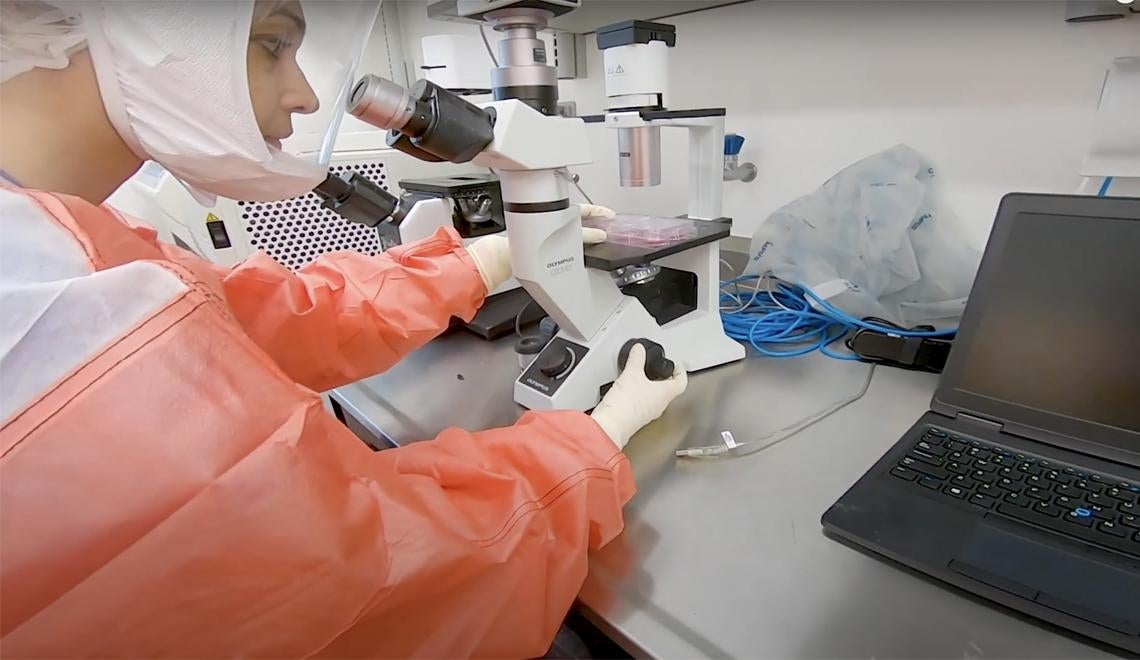
Subscribe to Pittwire Today
Get the most interesting and important stories from the University of Pittsburgh.Though he’s tackled stories about groundbreaking scientists before, making a movie about Pitt’s Center for Vaccine Research hadn’t exactly been on filmmaker Carl Kurlander’s radar. As with many people, however, the pandemic changed his plans.
In May 2020, he and Center Director Paul Duprex were featured on a CBS Sunday Morning segment. It compared Duprex's efforts to unlock the secrets of the novel coronavirus to Jonas Salk and team’s work on a polio vaccine at Pitt 66 years ago. Kurlander, senior lecturer in the Film and Media Studies program in the Kenneth P. Dietrich School of Arts and Sciences who produced the 2010 documentary on the vaccine, "The Shot Felt Round the World," was asked about parallels.

Later, when Kurlander and Duprex were on a Zoom call, Duprex pulled up a small whiteboard and began drawing a diagram with colored markers to illustrate the differences and similarities between the two research eras.
Kurlander said it was those colorful scribbles, along with Duprex's uniquely creative look at scientific research, that sparked the idea for the film.
“Maybe it’s also his Irish accent, but Paul has a gift for explaining science in an accessible way,” Kurlander said. “Looking at that whiteboard, I began realizing the need for quality information about vaccines, especially for educators teaching students remotely.”
So, Kurlander asked Duprex if he and his team would agree to be filmed in the lab. “Paul and I agreed that through understanding the science, people would trust the science,” said Kurlander.
What resulted is a half-hour film called “Chasing Covid” that will be screened in a free world premiere today at 7 p.m., the 66th anniversary of the day the Salk vaccine was declared safe and effective.
Shot at the Center for Vaccine Research over this past year, the movie was conceived to be used by educators to help demystify the process through which vaccines are made. After the premiere, the program will be free to educators to use in their classrooms to teach about the history of vaccines, what happens in the lab, how vaccine candidates go through animal and human testing, and the challenges of distributing the vaccines globally.
The event is hosted by Pitt’s University Library System (ULS) and the Center for Creativity. It is the first project for the new Pittsburgh Lens initiative at Pitt’s Center for Creativity.
Following the screening, there will be a discussion with panelists:
- Paul Duprex, director, Center for Vaccine Research and Jonas Salk Chair for Vaccine Research
- Peter Salk, professor of infectious disease and microbiology at Pitt’s Graduate School of Public Health and president of the Jonas Salk Legacy Foundation
- Sylvia Owusu-Ansah, pediatrician and EMS Medical Director at UPMC Children's Hospital and one of the first physicians to be vaccinated against COVID-19 in Western Pennsylvania
- Anita McElroy, pediatric infectious disease physician who, in addition to collaborating with Duprex on studying the novel coronavirus, runs the FAB Lab which focuses on some of the world's deadliest infectious diseases such as Ebola and River Valley fever virus
- Carl Kurlander, producer and director of “Chasing Covid,” and producer of both “The Shot Felt Round the World” and “Burden of Genius” about transplant pioneer Thomas Starzl
- Kornelia Tancheva, director of the ULS, will serve as moderator.
Collaboration and creativity
In the film, Duprex stresses how teams around the globe have been working together on current vaccine research. It was this collective effort, he said, that allowed the scientific community to develop several COVID-19 vaccines in record time. Similarly, Kurlander says when he first met Jonas Salk’s son Peter, the younger Salk was adamant in emphasizing that was also a team effort, involving scores of other individuals who worked in the Pitt virus lab as well as thousands of local schoolchildren who were given the then-experimental polio vaccine.
Kurlander said he hopes that young people realize they can use their creativity as scientists. He said the next generation is going to be living in a world of infection and disease and they are going to be the ones at the microscopes.
“This isn’t our last pathogen,” said Kurlander. “And young people shouldn’t be thinking they have to do something fun and creative or work in a lab.”
To that end, a new Take a Shot at Changing The World viral video contest sponsored by the Allegheny Intermediate Unit will also launch on April 12. It will encourage middle and high school students to make their own short videos about vaccines, for which cash prizes will be awarded later this year by a panel of judges.


